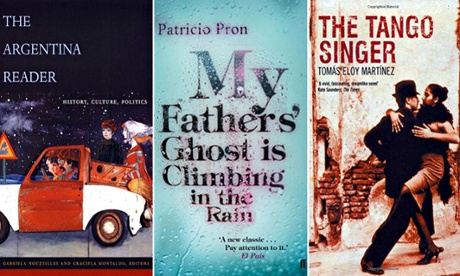
The Tango Singer by Tomás Eloy Martínez
Bruno Cadogan, a doctoral student in New York, is having trouble with his dissertation on Jorge Luis Borges’s essays on the tango. He decides to travel to Buenos Aires in search of inspiration and a disabled, haemophiliac tango singer named Julio Martel – rumoured to be even better than the legendary Carlos Gardel.
Cadogan arrives in the Argentinian capital in 2001, in the midst of financial meltdown and political instability. He traverses Buenos Aires in pursuit of the elusive singer, who makes unscheduled appearances in seemingly random locations across the city. But as he begins to unravel the mystery of Martel’s life, he learns that the tango singer’s performances map the city’s murky past.
Cadogan also develops an obsession with the “The Aleph” – the imaginary point in space that contains the entire universe – as described in a Borges short story.
In this vibrant and passionate novel, Tomás Eloy Martínez marries fact with fiction to reveal unsavoury events – human trafficking, torture and killings – in the history of “a city where unpunished crimes abound”. But it’s also an homage to both Buenos Aires and Borges.
Martínez, one of Argentina’s best-known journalists and authors, was forced into exile in the 1970s. He went to Venezuela, later moving to the US, and didn’t return to live in Argentina until 2006. He died in 2010.
My Father’s Ghost is Climbing in the Rain by Patricio Pron
Patricio Pron’s genre-defying novel of a struggle between memory and forgetting focuses on the “dirty war” in the 1970s.
The narrator returns to Argentina in 2008 from self-imposed exile in Berlin to be with his dying father. In his parents’ house, he finds a cache of documents relating to a recent missing-person case, that of 60-year-old Alberto José Burdisso. But the key is material relating to the disappearance of Alberto’s sister, Alicia, decades earlier, under the murderous military dictatorship. Through it, the son is able to piece together his father’s past.
He learns that his parents were part of an underground leftwing Peronist group that opposed the military junta – and that some members paid with their lives.
The quirky, fragmented telling of the story is challenging in parts, but perseverance pays dividends as the haunting novel excavates the family’s – and Argentina’s – tortured recent history.
“Your father isn’t sad that he fought the war,” the narrator’s mother says, “he’s only sad that we didn’t win.”
In this largely autobiographical tale, Pron pays tribute to those in his parents’ generation who defied the military dictatorship.
Pron was born in Argentina in 1975, the year before the dirty war began. He now lives in Spain.
The Argentina Reader edited by Gabriela Nouzeilles and Graciela Montaldo
This impressive collection of articles and documents introduces the reader to the enigma that is Argentina. Once one of the richest countries in the world, Argentina enters the 21st century with its economy in tatters and its politics tarnished by corruption and authoritarianism. The “missteps” that laid the country low are chronicled here.
A wide range of contributors – mostly Argentinians – write on history, society, politics and culture. Ten chapters tell the country’s story from the colonial period, through independence in 1810, to the 21st century.
The main focus is on the 20th century, when popular movements spur the “puzzling political phenomenon” of Peronism and the revolutionary ideals of the 1960s and 1970s. But these are brutally quashed as Argentina descends into “the bloodiest dictatorship in its history”: thousands are tortured and killed under military rule. When democracy finally returns, it comes with a bitter twist: hyperinflation, neoliberal policies, and IMF and World Bank edicts shatter Argentinians’ standard of living.
Although the book runs to almost 600 pages, the easily digestible chapters allow for dipping in and out at leisure. A richer and more eclectic overview of the country and its people would be hard to find.
Argentinian academics Gabriela Nouzeilles and Graciela Montaldo are professors at Princeton University and Columbia University, respectively.
• Check out the other countries in our World library series: Nigeria, Colombia, Vietnam, Egypt, Brazil, Kenya, Indonesia, Libya, Mexico, the Democratic Republic of the Congo, the Philippines, Iran, Peru, Somalia, China, Afghanistan, Haiti, Sudan and Thailand

